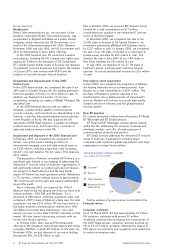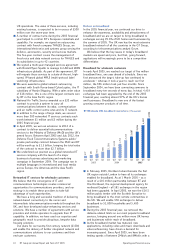BT 2005 Annual Report Download - page 18
Download and view the complete annual report
Please find page 18 of the 2005 BT annual report below. You can navigate through the pages in the report by either clicking on the pages listed below, or by using the keyword search tool below to find specific information within the annual report.apparatus, brought forward from the old regulatory regime,
should be removed and replaced by written undertakings
rather than by SMP apparatus conditions.
The Act obliges Ofcom to carry out further analyses of
markets which have been reviewed at such intervals as it
considers appropriate. In the Phase 2 consultation
document in the Strategic Review of Telecommunications,
Ofcom has made proposals for a number of market
reviews over the coming years. Ofcom is currently
carrying out a review of the Number Translation Services
(NTS) Call Termination market.
Enforcement
The Communications Act sets out the enforcement
process to be followed in relation to breaches of
conditions. Where a breach is not remedied following
preliminary notification by Ofcom, Ofcom may take
legally enforceable enforcement action and/or impose a
penalty of up to 10% of relevant turnover. In addition, a
person who suffers loss or damage as a result of a breach
may, with Ofcom’s consent, sue for damages, and, in the
case of serious and repeated contraventions, Ofcom may
restrict or suspend the provider’s entitlement to provide
electronic communications networks or services.
The Communications Act contains similar enforcement
procedures (though with much smaller penalties) for
matters such as non-compliance with a request for
information or non-payment of an administrative charge.
Appeals
One of the main features of the new regulatory framework
is that full appeals on the merits are now available against
regulatory decisions. Consequently, appeals can be made
against matters such as:
&the making of SMP, SMP apparatus and USO
determinations/designations;
&the setting, modification and revocation of conditions;
&enforcement actions, including the imposition of a
penalty.
Any person affected by a decision may appeal to the
Competition Appeals Tribunal. However, the Tribunal
must refer any matters in any appeal relating to price
controls on to the Competition Commission for
determination.
In November 2003, Ofcom issued a notification finding
that BT was acting in contravention of the General
Conditions by using customer-specific information
acquired from other communications providers in
connection with the provision of Carrier Pre-Selection
(CPS). In May 2004, Ofcom issued a second notification
finding that BT was similarly contravening the General
Conditions in relation to Wholesale Line Rental (WLR). BT
appealed both notifications, and the Tribunal adjourned
the WLR appeal pending the outcome of the CPS appeal.
In December 2004, the Tribunal dismissed BT’s CPS
appeal and upheld that notification (although this was
subject to a clarification of the definition of ‘marketing
activity’ as set out in the notification). Subsequently,
Ofcom withdrew the contested WLR notification,
indicating that it would issue a new notification in light of
the CPS decision. The Tribunal has suspended the WLR
appeal pending the new notification, which is expected
shortly.
Competition
The competitive environment
The UK telecommunications market is fully open and
highly competitive.
Although it is some years since the
Telecommunications Act 1984 abolished the monopoly of
the former statutory corporation, British
Telecommunications, obligations placed on BT, including
pricing regulation, network access, non-discrimination,
the provision of universal service and cost accounting/
accounting separation, are generally more onerous than
for other providers of electronic communications networks
and services.
Competition and the UK economy
The growth of mobile over the past decade has been a
major factor in shaping the UK’s telecommunications
landscape. Mobile now accounts for approximately 30% of
total UK voice minutes. BT’s market share of the total UK
voice market, including mobile, is estimated to have fallen
by about 4% in the 2005 financial year to approximately
40%.
BT’s share of the residential fixed-voice market, as
measured by the volume of fixed-to-fixed voice minutes,
declined to an estimated 64% for the 2005 financial year,
compared with an estimated 70% and 74% for the 2004
and 2003 financial years, respectively. CPS has been one
of the contributors to the loss of share in the fixed-voice
market. We estimate that BT had 42% of the market for
business fixed-voice calls in the 2005 financial year,
compared with an estimated 44% and 47% in the 2004
and 2003 financial years, respectively.
Estimated market shares are based on our actual
minutes, market data provided by Ofcom and an
extrapolation of the historical market trends.
We also estimate that BT supplied approximately 79%
of exchange lines in the UK at the end of the 2005
financial year, compared with 82% and 83% in the 2004
and 2003 financial years, respectively.
The growth in cable operators’ networks in the UK has
historically had an adverse effect on BT’s share of the
residential market. Current and future wholesale line
rental arrangements will allow BT’s fixed-line customers to
move PSTN lines to other operators which are expected to
be the source of more competition in the future.
Since 2000, we have been required to provide other
operators with the use of the lines connecting BT’s local
exchanges to our customers and to other operators to
install equipment in our exchanges (see Local Loop
Unbundling).
Competition Law
In addition to telecommunications industry regulation, BT
is subject to general competition law including the
Competition Act in the UK and the competition law
provisions of the EC Treaty.
UK and European Union competition law both prohibit
anti-competitive agreements, concerted practices and the
abuse of a dominant market position. In the application of
UK and EU competition law to electronic communications,
Ofcom has concurrent investigatory and enforcement
powers with the Office of Fair Trading (OFT). The EC has
jurisdiction to apply the EU rules. Breach of the relevant
prohibitions in the UK or EU rules could lead to fines of up
to 10% of worldwide turnover in a company’s previous
financial year and/or result in claims for damages in
Operating and financial review BT Group plc Annual Report and Form 20-F 2005 17
























